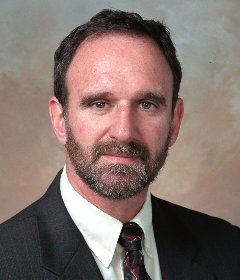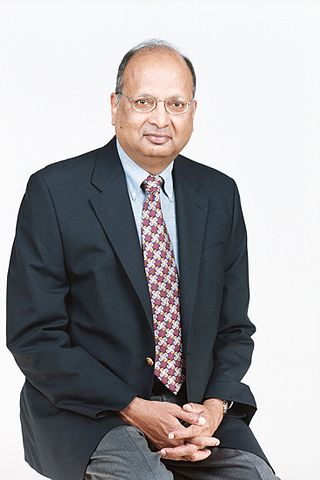
Madhu Sudan is an Indian-American computer scientist. He has been a Gordon McKay Professor of Computer Science at the Harvard John A. Paulson School of Engineering and Applied Sciences since 2015.

Martin Edward Hellman is an American cryptologist and mathematician, best known for his invention of public-key cryptography in cooperation with Whitfield Diffie and Ralph Merkle. Hellman is a longtime contributor to the computer privacy debate, and has applied risk analysis to a potential failure of nuclear deterrence.
Thomas Kailath is an Indian born American electrical engineer, information theorist, control engineer, entrepreneur and the Hitachi America Professor of Engineering emeritus at Stanford University. Professor Kailath has authored several books, including the well-known book Linear Systems, which ranks as one of the most referenced books in the field of linear systems.

Chandra Kumar Naranbhai Patel (born 2 July 1938) is an electrical engineer. He developed the carbon dioxide laser in 1963; it is now widely used in industry for cutting and engraving a wide range of materials like plastic and wood. Because the atmosphere is quite transparent to infrared light, CO2 lasers are also used for military rangefinding using LIDAR techniques.
Arun N. Netravali is an Indian–American computer engineer credited with contributions in digital technology including HDTV. He conducted research in digital compression, signal processing and other fields. Netravali was the ninth President of Bell Laboratories and has served as Lucent's Chief Technology Officer and Chief Network Architect. He received his undergraduate degree from IIT Bombay, India, and an M.S. and a Ph.D. from Rice University in Houston, Texas, all in electrical engineering. Several global universities, including the Ecole Polytechnique Federale in Lausanne, Switzerland, have honored him with honorary doctorates.

Francis Patrick Kelly, CBE, FRS is Professor of the Mathematics of Systems at the Statistical Laboratory, University of Cambridge. He served as Master of Christ's College, Cambridge from 2006 to 2016.

Arogyaswami J. Paulraj is an Indian-American electrical engineer, academic. He is a Professor Emeritus in the Dept. of Elect. Engg. at Stanford University.
Michael David Mitzenmacher is an American computer scientist working in algorithms. He is Professor of Computer Science at the Harvard John A. Paulson School of Engineering and Applied Sciences and was area dean of computer science July 2010 to June 2013. He also runs My Biased Coin, a blog about theoretical computer science.

Christopher Ray Johnson is an American computer scientist. He is a distinguished professor of computer science at the University of Utah, and founding director of the Scientific Computing and Imaging Institute (SCI). His research interests are in the areas of scientific computing and scientific visualization.
Guanrong Chen (陈关荣) or Ron Chen is a Chinese mathematician who made contributions to Chaos theory. He has been the chair professor and the founding director of the Centre for Chaos and Complex Networks at the City University of Hong Kong since 2000. Prior to that, he was a tenured full professor at the University of Houston, Texas. Chen was elected Member of the Academy of Europe in 2014, elected Fellow of The World Academy of Sciences in 2015, and elected IEEE Fellow in 1997. He is currently the editor-in-chief for the International Journal of Bifurcation and Chaos.
Lydia E. Kavraki is a Greek-American computer scientist, the Noah Harding Professor of Computer Science, a professor of bioengineering, electrical and computer engineering, and mechanical engineering at Rice University. She is also the director of the Ken Kennedy Institute at Rice University. She is known for her work on robotics/AI and bioinformatics/computational biology and in particular for the probabilistic roadmap method for robot motion planning and biomolecular configuration analysis.

Chai Keong Toh is a Singaporean computer scientist, engineer, industry director, former VP/CTO and university professor. He is currently a Senior Fellow at the University of California Berkeley, USA. He was formerly Assistant Chief Executive of Infocomm Development Authority (IDA) Singapore. He has performed research on wireless ad hoc networks, mobile computing, Internet Protocols, and multimedia for over two decades. Toh's current research is focused on Internet-of-Things (IoT), architectures, platforms, and applications behind the development of smart cities.
V Ramgopal Rao is an Indian academic currently serving as the Group Vice Chancellor of Birla Institute of Technology and Science, Pilani for campuses located in Pilani, Dubai, Goa, Hyderabad and Mumbai. He was previously the Director of IIT, Delhi for six years during 2016-2021.
Sanghamitra Bandyopadhyay is an Indian scientist specializing in computational biology. A professor at the Indian Statistical Institute, Kolkata, she is a Shanti Swarup Bhatnagar Prize winner in Engineering Science for 2010, IInfosys Prize 2017 laureate in the Engineering and Computer Science category and TWAS Prize winner for Engineering Sciences in 2018. Her research is mainly in the areas of evolutionary computation, pattern recognition, machine learning and bioinformatics. Since 1 August 2015, she has been the Director of the Indian Statistical Institute, and she would oversee the functioning of all five centres of Indian Statistical Institute located at Kolkata, Bangalore, Delhi, Chennai, and Tezpur besides several other Statistical Quality Control & Operation Research Units spread across India. She is the first woman Director of the Indian Statistical Institute. Currently she is on the Prime Ministers' Science, Technology and Innovation Advisory Council. In 2022 she was given the Padma Shri award for Science and Engineering by the Government of India.

Bulusu Lakshmana Deekshatulu is an Indian academic who has made important contributions to Digital Image Processing and Control Theory. He is a Fellow of The World Academy of Sciences, Fellow of Indian National Science Academy, The National Academy of Sciences, India, Indian Academy of Sciences, Indian National Academy of Engineering, National Academy of Agricultural Sciences, and IEEE.
Tamara Macushla Munzner is an American-Canadian scientist. She is an expert in information visualization who works as a professor of computer science at the University of British Columbia (UBC).
Paranandi Venkata Suryanarayana Rao is an Indian computer scientist, known for his research in the fields of speech and script recognition and is credited with contributions to the development of TIFRAC, the first indigenously developed electronic computer in India. He is a recipient of awards such as IEEE Third Millenium Medal, Vikram Sarabhai Award, Om Prakash Bhasin Award and VASVIK Industrial Research Award. The Government of India awarded him the fourth highest civilian honour of Padma Shri in 1987.
Ranjan Kumar Mallik is an Indian electrical and communications engineer and a professor at the Department of Electrical Engineering of the Indian Institute of Technology, Delhi. He held the Jai Gupta Chair at IIT Delhi from 2007 to 2012 and the Brigadier Bhopinder Singh Chair from 2012 to 2017. He is known for his researches on multiple-input multi-output systems and is an elected fellow of all the three major Indian science academies viz. Indian Academy of Sciences, Indian National Science Academy, and The National Academy of Sciences, India. He is also an elected fellow of The World Academy of Sciences, Indian National Academy of Engineering, and The Institute of Electrical and Electronics Engineers, Inc.
Yendluri Shanthi Pavan is an Indian electrical engineer and a professor at the Department of Electrical Engineering of the Indian Institute of Technology, Madras. He is known for his studies on mixed signal VLSI circuits and is an elected fellow of the Indian National Academy of Engineering. He is also a fellow of IEEE. The Council of Scientific and Industrial Research, the apex agency of the Government of India for scientific research, awarded him the Shanti Swarup Bhatnagar Prize for Science and Technology, one of the highest Indian science awards for his contributions to Engineering Sciences in 2012.







